Share
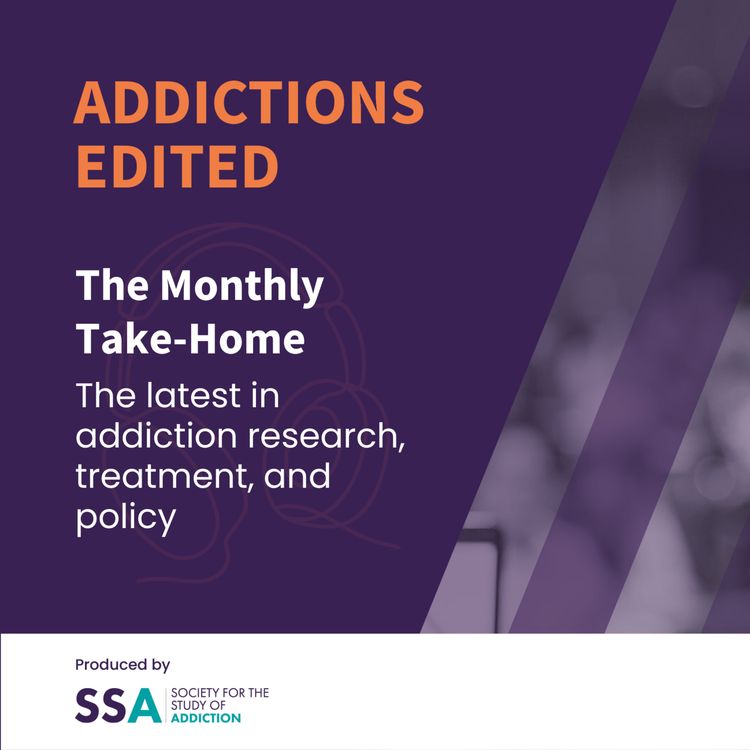
Addictions Edited
Methadone, bupernorphine and COVID-19, with Nicky Kalk and Caroline Copeland
Dr Nicky Kalk and Dr Caroline Copeland talk about their research into methadone- and buprenorphine-related deaths during the COVID-19 pandemic. Nicky and Caroline talk me through the number of deaths they would expect to see in an average year and the differences between that and what happened during COVID-19-related lockdowns. Nicky tells us how the UK has influenced the US response to Hurricane Katrina whereby people were given larger amounts of opioid agonist medication than they were used to.
Caroline and Nicky then talk about possible explanations for the overdose rates found among people not in treatment, indicating the protective impact that treatment can have for people. They also talk about how their study challenged their thinking about the impact of diversion on the risk of overdose. Finally, they talk about the overall impact that the COVID-19 pandemic had on people seeking and accessing treatment.
The opinions expressed in this podcast reflect the views of the author and do not necessarily represent the opinions or official positions of the SSA or the author’s academic institution.
The SSA does not endorse or guarantee the accuracy of the information in external sources or links and accepts no responsibility or liability for any consequences arising from the use of such information.
More episodes
View all episodes
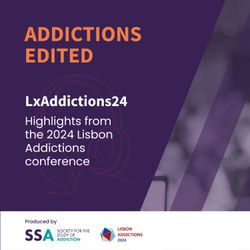
14. LxAddictions24: Interview with poster prize winners
34:38||Season 4, Ep. 14The official Lisbon Addictions podcast brings you a catch-up conversation with consultant Dominique Lopez, and poster prize winners Eman Mshari and Ebtesam Saleh.Dominique Lopez worked on the early career researcher programme for Lisbon Addictions 2024.Eman Mshari is a pharmacist from Kuwait, who is currently pursuing her PhD in pharmacology and toxicology at King's College London.Ebtesam Saleh is a pharmacist and a doctoral candidate at Charité Universitätsmedizin Berlin. She was awarded the Fred Yates Prize in 2023 by the Society for the Study of Addiction (SSA) in recognition of her significant and specific contributions to the addictions field.The opinions expressed in this podcast reflect the views of the author(s) and do not necessarily represent the opinions or official positions of the SSA.The SSA does not endorse or guarantee the accuracy of the information in external sources or links and accepts no responsibility or liability for any consequences arising from the use of such information.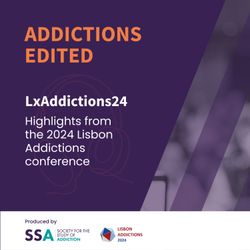
13. LxAddictions24 live: Day 3
22:08||Season 4, Ep. 13The official Lisbon Addictions podcast brings you all the talks, events, seminars from day three of the Lisbon Addictions conference.Ben Scher is an SSA funded PhD Student at Oxford University.Dr Elle Wadsworth is a researcher based at the University of Bath and at RAND Europe. Rob Calder is Head of Communications and Operations for the Society for the Study of Addiction.Zoe Swithenbank is a researcher at Liverpool John Moores University.The opinions expressed in this podcast reflect the views of the author(s) and do not necessarily represent the opinions or official positions of the SSA.The SSA does not endorse or guarantee the accuracy of the information in external sources or links and accepts no responsibility or liability for any consequences arising from the use of such information.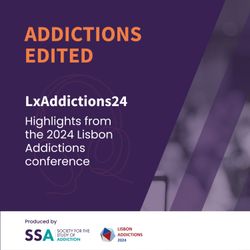
12. LxAddictions24 live: Day 2
16:55||Season 4, Ep. 12The official Lisbon Addictions podcast brings you all the talks, events, seminars from day two of the Lisbon Addictions conference.Ben Scher is an SSA funded PhD Student at Oxford University.Dr Elle Wadsworth is a researcher based at the University of Bath and at RAND Europe. Rob Calder is Head of Communications and Operations for the Society for the Study of Addiction.Zoe Swithenbank is a researcher at Liverpool John Moores University.The opinions expressed in this podcast reflect the views of the author(s) and do not necessarily represent the opinions or official positions of the SSA.The SSA does not endorse or guarantee the accuracy of the information in external sources or links and accepts no responsibility or liability for any consequences arising from the use of such information.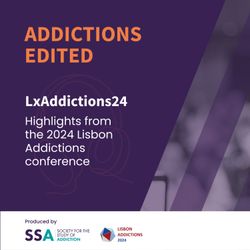
11. LxAddictions24 live: Vanda Felbab-Brown
04:58||Season 4, Ep. 11Elle talks to Vanda about her upcoming session at the Lisbon Addictions conference. Vanda Felbab-Brown is a Senior fellow in Foreign Policy at The Brookings Institution.Dr Elle Wadsworth is a researcher based at the University of Bath and at RAND Europe. The opinions expressed in this podcast reflect the views of the author(s) and do not necessarily represent the opinions or official positions of the SSA.The SSA does not endorse or guarantee the accuracy of the information in external sources or links and accepts no responsibility or liability for any consequences arising from the use of such information.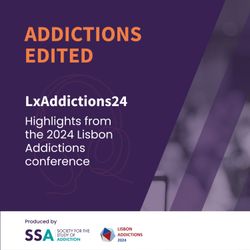
10. LxAddictions24 live: Day 1
18:53||Season 4, Ep. 10The official Lisbon Addictions podcast brings you all the talks, events, seminars from day one of the Lisbon Addictions conference.Ben Scher is an SSA funded PhD Student at Oxford University.Dr Elle Wadsworth is a researcher based at the University of Bath and at RAND Europe. Rob Calder is Head of Communications and Operations for the Society for the Study of Addiction.Zoe Swithenbank is a researcher at Liverpool John Moores University.The opinions expressed in this podcast reflect the views of the author(s) and do not necessarily represent the opinions or official positions of the SSA.The SSA does not endorse or guarantee the accuracy of the information in external sources or links and accepts no responsibility or liability for any consequences arising from the use of such information.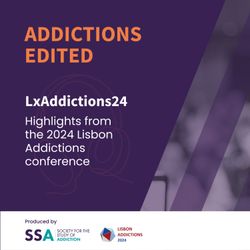
9. LxAddictions24: The open track
28:58||Season 4, Ep. 9In this episode, Dr Elle Wadsworth talks to Dr Paul Griffiths about his role throughout Lisbon Addictions and specifically in convening the 'Open Track'. Elle and Paul discuss the launch of the European Union Drugs Agency (EUDA) and how it has changed since being known as the EMCDDA. They talk about EUDA’s work at the boundary between science, practice and policy at a European level. They also talk about collaborating with the Institute on Addictive Behaviours and Dependencies (ICAD) to organise the Lisbon Addictions conference.Paul explains the role of the conference's many co-producers in bringing the scientific programme together, going through the themes for each day at the conference, the plenaries and the two debate sessions designed to encourage discussion among conference attendees. One debate will be on 'why are we not doing better at reducing drug-related deaths?', and one on 'how can the voices of people with lived experience, clients and communities impacted by drug use better inform clinical practice, research and the policy agenda?'."We're all getting really excited to welcome again a lot of people to Lisbon.... it's going to be a busy week for everyone but I hopefully a fun and productive one!"Dr Paul Griffiths is the scientific director of the EU Drugs Agency (EUDA, formerly the EMCDDA). Dr Elle Wadsworth is a researcher based at the University of Bath and at RAND Europe. The opinions expressed in this podcast reflect the views of the author(s) and do not necessarily represent the opinions or official positions of the SSA.The SSA does not endorse or guarantee the accuracy of the information in external sources or links and accepts no responsibility or liability for any consequences arising from the use of such information.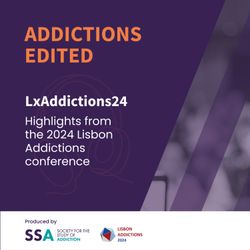
8. LxAddictions24: Early career researchers
20:16||Season 4, Ep. 8In this episode, Dr Rob Calder talks to Dominique Lopez and early-career researchers Dr Jorge Martins and Olivia Price about the ECR track at Lisbon Addictions. Rob, Dominique, Jorge and Olivia discuss how you can make the most of the ECR programme’s networking opportunities and activities before, during and after the conference. During the conference there will be a number of sessions designed to meet the needs of ECRs along with an award for best e-poster.Dominique, Jorge, and Olivia then give some advice for ECRs going to Lisbon Addictions for the first time this year.“Something that's really helped me at conferences in the past is going to an event before the conference...because it's just a smaller setting and I find that's just an easier setting to introduce yourself to someone you don't know.”Olivia Price"Try to set up a meeting during the conference, my experience is that people are quite open to those meetings and I think that's a fantastic opportunity to expand your network and also talk about research."Dominique Lopez is a consultant for Lisbon Addictions who has been working on the early career researcher programme.Jorge Martins is a post-doctoral researcher from the William James Center for Research and the Institute of Applied Psychology (ISPA) in Portugal.Olivia Price is a PhD student at the University of New South Wales.Rob Calder is Head of Communications and Operations for the Society for the Study of AddictionThe opinions expressed in this podcast reflect the views of the author(s) and do not necessarily represent the opinions or official positions of the SSA.The SSA does not endorse or guarantee the accuracy of the information in external sources or links and accepts no responsibility or liability for any consequences arising from the use of such information.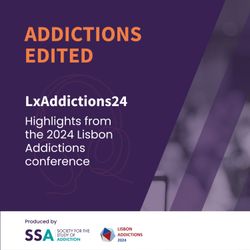
7. LxAddictions24: Prevention of risky and harmful behaviours
17:17||Season 4, Ep. 7In this episode, Dr Rob Calder talks to Dr Ina Koning from European Society for Prevention Research (EUSPR) about her work as a co-producer for Lisbon Addictions. Rob and Ina discuss the EUSPR track's focus on prevention. They cover interventions, treatment, and the wide range of outcomes, substances and behavioural addictions. They also discuss how these can change according across populations including young people, families and professionals.They also talk about the process of putting together sessions for Lisbon Addictions before sharing some pointers for first-time attendees at Lisbon Addictions.“Because of the huge variety of topics, the huge variety of sessions and talks, there's always something of interest going on.”Ina Koning is an Associate Professor in clinical child and family studies at the Vrije Universiteit in Amsterdam.Rob Calder is Head of Communications and Operations for the Society for the Study of Addiction.The opinions expressed in this podcast reflect the views of the author(s) and do not necessarily represent the opinions or official positions of the SSA.The SSA does not endorse or guarantee the accuracy of the information in external sources or links and accepts no responsibility or liability for any consequences arising from the use of such information.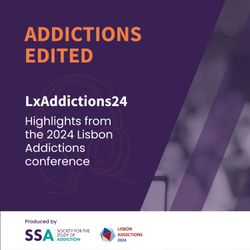
6. LxAddictions24: Hepatitis C, other infectious diseases, and drug-related harms
09:51||Season 4, Ep. 6In this episode, Ben Scher talks to Emma Day from the International Network on Health and Hepatitis in Substance Users (INHSU) about being a co-producer for Lisbon Addictions. Ben and Emma discuss this track looking at research on issues such as hepatitis, HIV, soft tissue infection and overdose prevention from epidemiological, clinical science, social science and treatment perspectives.They talk about how they put together a track for Lisbon Addictions, making sure the sessions fit the conference. Emma and Ben also share their experiences of Lisbon Addictions and give some advice for people attending for the first time.“What I really like about Lisbon Addictions is that it's a really broad church, you've got lots of different tracks in the addiction field, content that wouldn't ordinarily cross my desk....and I think that kind of cross-fertilisation of ideas across the tracks is really exciting.”Emma Day is the executive director at INHSU.Ben Scher is an SSA funded PhD Student at Oxford University.The opinions expressed in this podcast reflect the views of the author(s) and do not necessarily represent the opinions or official positions of the SSA.The SSA does not endorse or guarantee the accuracy of the information in external sources or links and accepts no responsibility or liability for any consequences arising from the use of such information.